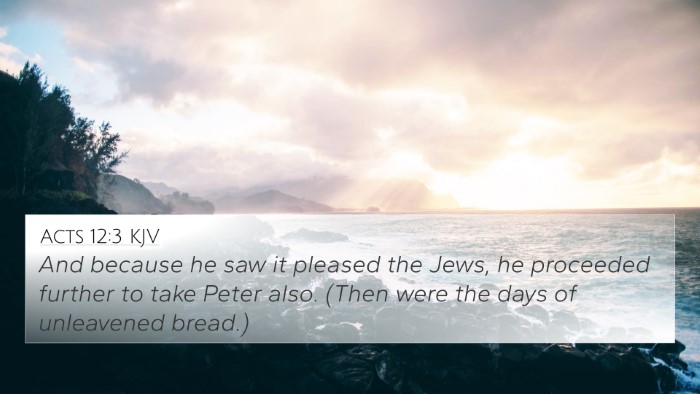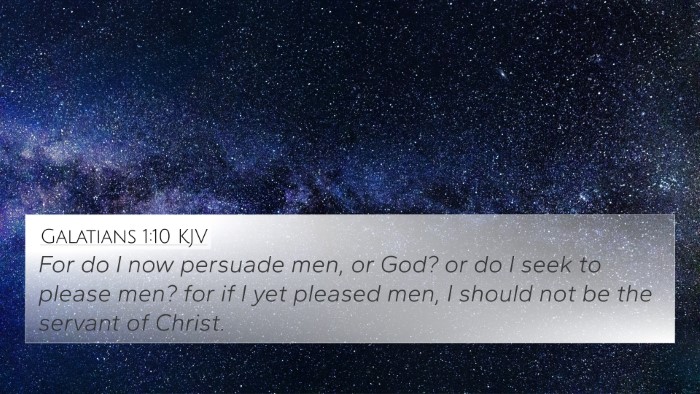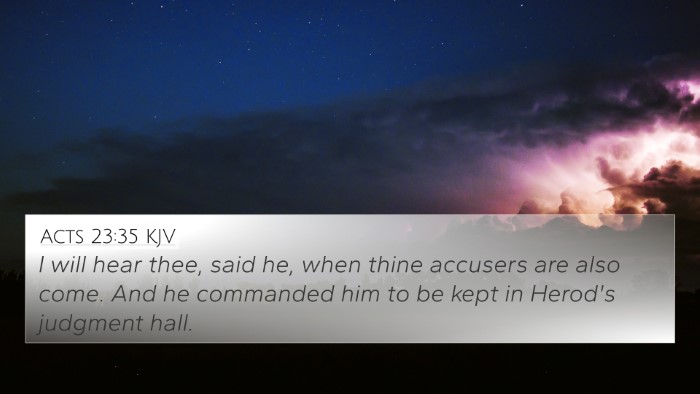Old Testament
Genesis Exodus Leviticus Numbers Deuteronomy Joshua Judges Ruth 1 Samuel 2 Samuel 1 Kings 2 Kings 1 Chronicles 2 Chronicles Ezra Nehemiah Esther Job Psalms Proverbs Ecclesiastes Song of Solomon Isaiah Jeremiah Lamentations Ezekiel Daniel Hosea Joel Amos Obadiah Jonah Micah Nahum Habakkuk Zephaniah Haggai Zechariah MalachiActs 24:27 Similar Verses
Acts 24:27 Cross References
But after two years Porcius Festus came into Felix' room: and Felix, willing to shew the Jews a pleasure, left Paul bound.
Uncover the Rich Themes and Topics of This Bible Verse
Listed below are the Bible themes associated with Acts 24:27. We invite you to explore each theme to gain deeper insights into the Scriptures.
Acts 24:27 Cross Reference Verses
This section features a detailed cross-reference designed to enrich your understanding of the Scriptures. Below, you will find carefully selected verses that echo the themes and teachings related to Acts 24:27 KJV. Click on any image to explore detailed analyses of related Bible verses and uncover deeper theological insights.

Acts 25:9 (KJV) »
But Festus, willing to do the Jews a pleasure, answered Paul, and said, Wilt thou go up to Jerusalem, and there be judged of these things before me?

Acts 25:14 (KJV) »
And when they had been there many days, Festus declared Paul's cause unto the king, saying, There is a certain man left in bonds by Felix:

Acts 25:1 (KJV) »
Now when Festus was come into the province, after three days he ascended from Caesarea to Jerusalem.

Acts 12:3 (KJV) »
And because he saw it pleased the Jews, he proceeded further to take Peter also. (Then were the days of unleavened bread.)

Mark 15:15 (KJV) »
And so Pilate, willing to content the people, released Barabbas unto them, and delivered Jesus, when he had scourged him, to be crucified.

Galatians 1:10 (KJV) »
For do I now persuade men, or God? or do I seek to please men? for if I yet pleased men, I should not be the servant of Christ.

Acts 26:32 (KJV) »
Then said Agrippa unto Festus, This man might have been set at liberty, if he had not appealed unto Caesar.

Acts 28:30 (KJV) »
And Paul dwelt two whole years in his own hired house, and received all that came in unto him,

Acts 26:24 (KJV) »
And as he thus spake for himself, Festus said with a loud voice, Paul, thou art beside thyself; much learning doth make thee mad.

Acts 23:35 (KJV) »
I will hear thee, said he, when thine accusers are also come. And he commanded him to be kept in Herod's judgment hall.

Acts 25:4 (KJV) »
But Festus answered, that Paul should be kept at Caesarea, and that he himself would depart shortly thither.

Proverbs 29:25 (KJV) »
The fear of man bringeth a snare: but whoso putteth his trust in the LORD shall be safe.

Exodus 23:2 (KJV) »
Thou shalt not follow a multitude to do evil; neither shalt thou speak in a cause to decline after many to wrest judgment:
Acts 24:27 Verse Analysis and Similar Verses
Understanding Acts 24:27
Acts 24:27 states: "But after two years Porcius Festus came into Felix' room: and Felix, willing to shew the Jews a pleasure, left Paul bound." This verse falls within the narrative of Paul’s imprisonment in Caesarea and highlights the political dynamics surrounding his case.
Contextual Background
This verse occurs at a pivotal moment in the Book of Acts, elucidating the transition of governance from Felix to Festus. Understanding the historical and political context is crucial for interpreting this passage.
Political Dynamics
Felix, the Roman governor at the time, was known for his corrupt administration, and his decision to leave Paul imprisoned despite the absence of any legitimate charges reflects his desire to appease the Jewish leaders.
Thematic Insights
- Justice and Injustice: Paul’s unjust imprisonment serves as a reminder of political corruption.
- Leadership Transition: The shift from Felix to Festus symbolizes change in governance and potential shifts in judicial procedures.
- Political Favor: Felix’s actions illustrate how leaders may prioritize political favor over justice.
Comparative Analysis with Other Scriptures
To deepen our understanding of Acts 24:27, we can identify several Bible cross-references that are thematically and contextually related:
- Acts 23:33-35 - Paul's transfer to Felix and the initial judicial proceedings.
- Acts 25:1-12 - Festus’s evaluation of Paul’s case and the continuation of legal proceedings.
- Matthew 24:9 - Persecution for the sake of righteousness, paralleling Paul’s unjust treatment.
- Romans 13:1-5 - The scriptural view on authority and governance, relevant to understanding Felix’s actions.
- Acts 16:20-24 - Paul’s imprisonment in Philippi, showcasing similar themes of injustice.
- 2 Timothy 4:17 - Paul’s faith during unjust trials and the need for God's support.
- 1 Peter 2:19-20 - Encouragement in suffering for doing good, pertinent to Paul’s situation.
Connecting Acts 24:27 in a Broader Biblical Context
When cross-referencing Acts 24:27 with other biblical texts, we find several threads that weave a narrative of leadership challenges, injustice, and divine faithfulness:
- Inter-Biblical Dialogue: The link between Paul's trials and the experiences of other figures like Joseph (Genesis 39:20-21) and Daniel (Daniel 6:16) involves suffering for righteousness.
- Thematic Connections: The central theme of faith amid trials resonates throughout the Bible, especially in the stories of the prophets and apostles who faced similar fates.
- Comparative Studies: Analyzing this instance in relation to Christ's own unfair trial (Matthew 27:11-26) reveals a pattern of unjust legal proceedings against divine representatives.
Applications for Today
Acts 24:27 offers contemporary readers lessons on the nature of justice, leadership accountability, and the trials of faith. It encourages them to consider:
- The Role of Leaders: How current leaders balance duty and personal interests.
- Faith in Adversity: Maintaining faith when confronted with injustice.
- Community Responsibility: The importance of supporting those who suffer for their convictions.
Conclusion
In summary, Acts 24:27 serves as a crucial reminder of the sociopolitical currents affecting justice in Biblical times, offering timeless lessons for believers today. By exploring cross-references and thematic connections, we can gain a deeper understanding of the challenges faced by early Christians, their faith, and the overarching narrative of the Bible.



